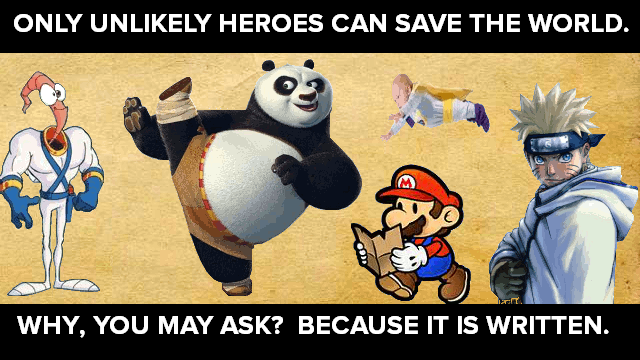
Please note that this writer is in no way, shape or form attacking the feature of unique leads in stories, especially where it pertains to Hobbits and rings. This piece has been written primarily as a deterrent to the dead-ends of redundancy he feels many storytellers and publicists have been gridlocked into.
After the monumental success of the Lord of the Rings film trilogy, it seemed everyone and their mothers decided that the more peculiar they advertised their fictional heroes, the more their stories would resonate with their audiences. Sadly, this marketing gimmick became so commonplace in the twenty-first century that the term “unlikely” quickly became the cinematic and novel cliché of its first decade– a stark irony to say the least. I clarify this to our shame.
Of course, it would be foolishness to suggest that all media that feature improbable leads are bad simply because the marketing strategy has been abused. But when writers, producers and developers pinpoint out these particular character types and set them at the zenith of fantasy literature, it should make consumers wonder, what exactly does this entail? I can attest and bear witness to the fact that for every so-called likely hero you’ll find in this modern era, you will run across two or three dozen unlikely ones along the way, because practically every modern children’s narrative uses that revolting trope in its summary. Regardless of how smoothly the description rolls off the tongue or how truly accurate it is to the persona presented, the “unlikely hero” has grown into an oxymoron that storytellers of today would be better off abandoning. A heroic nature never comes naturally, and no hero was born that way; yet Hollywood still embraces calling every Tom, Dick and Harry that hits the big screen an unlikely hero – which suggests that such a thing as a likely hero exists. But it doesn’t. If you look deeply enough into the heart and background of any given hero, you will find a soul that beat all odds and overcame some major obstacle before finding his or her place in the world.

What makes Frodo any more unlikely than the rest of the Hobbits?
As you probably know, next of kin to the unlikely hero is the chosen one of ancient prophecy. Literally hundreds of stories are led (or become led) by the intertwining ideas of fate and destiny. This predictable plot device spawned from the prophetic world of non-fiction. However, real-world prophecies are open for discussion and application, whereas the utilization of prophecies in fiction more often than not serves only to downplay the intensity of the drama. Think about it– if I were to write that I would underline five of the words in my next sentence, what reason would you have not to accept it as fact? I would be writing my own prophecy to fulfill, which should be thought of as no less than an absolute spoiler that obliterates the gripping suspense only the unexpected can bring.
Naturally, these hackneyed concepts would infiltrate all forms of entertainment – video games included. But in their defense, few gaming companies have actually tried to sell their games by stamping how unlikely their heroes are on the back of the product or in the story synopsis. Nintendo, to the best of my knowledge, has never attempted to force the unlikelihood of Mario or any of its protagonists down our throats, despite how definitive to the word most of them have been. This makes me proud, actually. Not that the likely are excluded, but that Nintendo has never found it crucial or mandatory to go with the flow and pound the unlikeliness of its heroes into our faces as a means to market them. Because honestly, when it gets down to it, all heroes, whether big or small, mighty or weak, are defined by their actions – not by who they are or what they at first seem to be.




 ShareThis
ShareThis







Interesting read. I’m not sure that I share your intense feelings regarding the unlikely hero, especially that it’s more recent. It seems like that’s always been something of a fascination, particularly in the States: just look at Luke Skywalker, for example.
Of course, the opposite end of the spectrum exists too, especially back in the 80s and 90s with the “action-hero” stereotype. Perhaps the pendulum has just swung closer to the everyman side of things, and is just waiting to swing back.
It is not the existence of the unlikely hero that is recent, it is the label and its modern mass-marketing. That’s the part that irks me. Read the excerpt of any given Dreamworks CGI movie, and you can bet your britches the “hero” will be called unlikely. Every last one of them.
But you’re right – it all probably stems back from the 1980s and its boatload of “Mega Macho Man Movies.” I guess we can thank Schwarzenegger and Stallone for this.